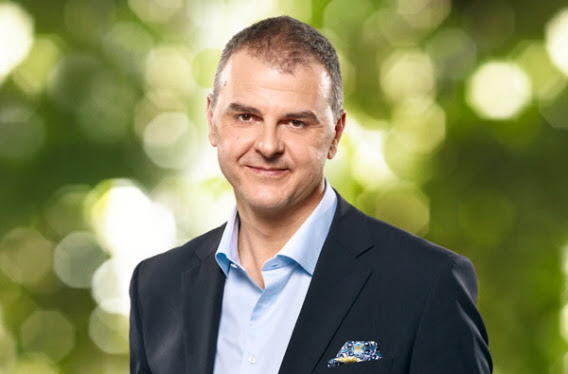An Interview with Swedish Politician Jasenko Selimovic
by Orlando Luis Pardo Lazo / June 9, 2014 / No comments
“The European Parliament should not accept negotiations with a non-democratically elected government.”
Jasenko Selimovic was born in 1968 in Sarajevo, Bosnia. He is a theatre art director and member of the Swedish Folkpartiet (Liberal Party). He defines himself as “Democrat” and “European,” in that order. On May 20, 2014 he gave this interview by e-mail. Here Selimovic discusses his concerns about the impending trade agreement between the European Union and Cuba and the importance of involving the Cuban opposition in the negotiations.

- Is it worth-while to focus on the last images and letters coming from the inside of the last living utopia on Earth? Is Cuba by now a contemporary country or just another old-fashioned delusion in the middle of Nowhere-America? A Cold-War Northtalgia maybe? Can we expect a young Rewwwolution.cu within that Ancien Régime still known as The Revolution? I would like to provoke more questions than answers.

- Orlando Luis Pardo Lazo was born in Havana City and still resides and resists there, working as a free-lance writer, photographer and blogger. He is the author of Boring Home (2009) and is the editor of the independent opinion and literary e-zine Voces.
In Cuba, despite efforts carried out by the European Union in terms of human rights, social activists now fear that by opening trade with the Cuban regime the scenario may change quickly. How seriously should the EU consider the repressive nature of Cuba’s single-party system?
Very seriously. In my opinion the European External Action Service (EEAS) must take into account the lack of human and civil rights that impregnates Cuban society, which is the result of an intransigent single-party system that’s completely incompatible with the values of the European Union. The EEAS should definitely include the Cuban opposition in the dialogue in order to take their demands and recommendations into account. The European Parliament should not accept negotiations with a non-democratically elected government of such a repressive nature and should put more pressure on the European Commission.
If I am elected into the European Parliament I will certainly contribute to pressuring the European Commission so they act accordingly, and I will definitely support the will and demands of Cuban civic society, represented by different oppositional democratic groups and individuals.
Should the fate of Cuban civic society, today more vulnerable than ever, be relevant for the seemingly unavoidable investment deal between the European Union and Havana?
Yes, it should. Cuban civic society has suffered enough during these years of communism, poverty, absence of civil liberties, and, above all, systematic repression. Companies investing in Cuba will engage in negotiations with the Cuban regime, which does not really care about the fate of its people, or basic worker’s rights. Therefore, the European Parliament, as the democratically elected body of this Union, should emphasize the negative consequences of such a deal. The Cuban regime will use this opportunity to profit from the deal, so as a member of the European Parliament, I would like to ask the Commission how it plans to oversee “the level of transparency” of such economic engagement. I will also remind the commission that Europe is contributing to making a corrupt and repressive government rich, giving it more resources to use against its own people. Finally, I would like to demand the exact details of this deal in terms of investments and profits, so the Cuban people are aware of what the Cuban regime is doing behind their backs.
In the near future, besides the improvement of government-to-government relations, should solidarity between pro-democracy activists in Cuba and the European Union be expected?
The answer to this question should be “Yes” because it’s the right thing to do. It should be the right way to act, although the left lobby have for many years undermined this opportunity—the opportunity to live up to the democratic values of the European Union through supporting pro-democracy activists in Cuba. I can only say that I truly believe that solidarity should be directed towards those who need it the most, towards those who do not have a voice or a platform to influence their own fate—in this case, the Cuban people. I doubt whether the European Union is able to act in a united and consistent manner to achieve this, but I’m certain that the more we speak up, the better, and that the more often we receive Cuban dissidents at European institutions and acknowledge them, the better. We really need to focus on this type of support during the upcoming legislation in 2014 thru 2019. According to my political convictions, it is absolutely not acceptable that a totalitarian regime like Cuba is allowed to lobby the Commission while the Cuban people are being ignored. It is disgraceful and we should not tolerate it.
The growing influence of Russia and China in Latin America’s authoritarian democracies seems of little worry to Washington, D.C., as they haven’t expressed much concern about the sale of weapons, or even plans to install military bases in our hemisphere.
Should this issue be more relevant for the European Union’s geopolitical interests today? How can it be handled without abandoning democratic values, given the pressure imposed by the controlled fuel markets? Is a Cold War II scenario conceivable in the near future?
This is a possible scenario that could certainly have an impact on global and European security. In a global world we cannot pretend that we still live in a national state, and thereby the need for international cooperation becomes extremely important and immediate. As for the European Union, it’s extremely important to have one common foreign policy instead of 28, which is the case today, so Europe can serve as a global actor to balance out non-democratic players like Russia or China.
The Russian behavior pattern goes beyond borders, as we have seen with the intervention and illegal appropriation of Crimea in Ukraine, which took place on European soil. Unfortunately, the European Union was not capable of acting in a unanimous way against Russia, which should be a lesson for European institutions and national states. Unfortunately, there are no guarantees that Russia will not continue annexing other territories or use its energy supplies as a geopolitical weapon to destabilize other countries.
It’s about time for Europe to become less dependent on Russian gas. The European Union and the United States should not exonerate Russia as long as it implies an imminent menace at global level and more concrete measures should be taken.





